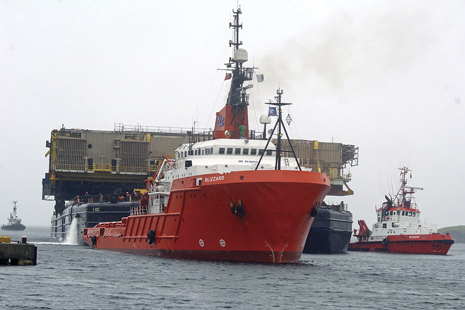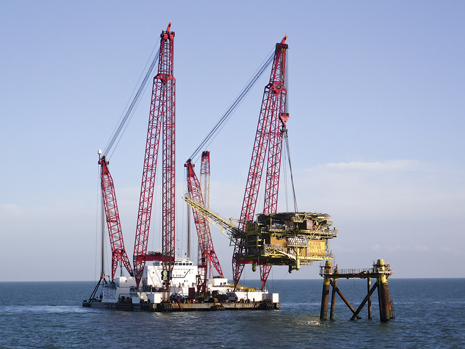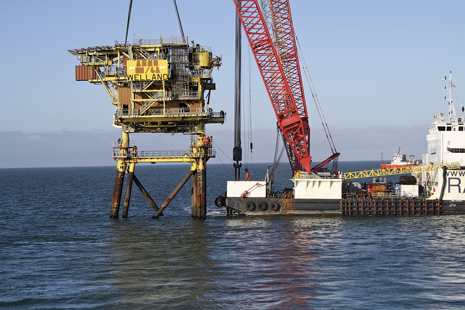Decom North Sea pushes decommissioning projects forward
EUR. ING. BRIAN NIXON, Chief Executive, Decom North Sea The 2012 UK national Budget provided the promise of a set level of relief for oil and gas operators, which will assist the whole industry. The changes announced by the UK Treasury in March 2012, regarding tax relief for decommissioning, are expected to provide the certainty of government contribution to each decommissioning project. This should deliver greater assurance over liabilities and help to stimulate late-life acquisition, but it also will give greater confidence to those operators that are approaching the end of economic field life. It is hoped that this announcement will also result in a steadier rate of activity in the North Sea market, provide companies with more confidence, and encourage the pace of investment and innovation within the industry. The tax relief will assist the whole industry, particularly the smaller breed of operators working in the North Sea. It will encourage more asset sales, with prospective buyers now having greater assurance of governmental support, when the assets reach the decommissioning phase. It is still too early to see any measurable impact from the Budget announcement, but several operators are known to be progressing steadily with their plans. The industry is seeing a ramp-up in the sector, with some contracts recently awarded, a number of important invitations to tender under way or expected soon, and lots of study and analysis work going on in the market place. DECOMMISSIONING RAMP-UP EXPECTED Next year is expected to see the submission of more decommissioning programs for approval by the regulators, more plugging and abandoning (P&A) of wells, the award of some major contracts for transportation and onshore disposal, and some further decommissioning projects of subsea and southern North Sea assets, like the Welland platform removal, Fig, 1.
Current regulations dictate that man-made structures in northwestern European waters are required to be removed at the end of their economic life, unless there are very specific reasons why they should be left on site. Programs often slip, due to multiple reasons with the owners/operators of offshore oil and gas production facilities choosing to defer the start of the decommissioning process. Decommissioning projects are expensive, and there is no return on the expenditure. New technologies have been successfully introduced over the years, resulting in numerous fields producing far beyond their original design life. The ability to target and exploit marginal satellite reservoirs has increased significantly over time, and at ever greater distances from the mother facility. The processing and/or transportation of third-party oil or gas can also defer decommissioning. Decommissioning projects are complex, with technical, safety and environmental challenges, resulting in rigorous, detailed planning and options appraisal adding to the time taken to finalize the strategy for each custom-built facility. Current regulations do not drive the start of the removal process, so there is no time pressure. Despite this, there is growing awareness in North Sea countries that the industry is facing a bow wave of decommissioning activity in the coming years, as evidenced by the amount of planning and preparation currently underway in the sector. Professor Alex Kemp from the University of Aberdeen estimates that the cost of decommissioning some 550 fixed, floating and subsea installations in the UK Continental Shelf alone to be £30 billion to- £36 billion between now and 2040. On the one hand, this represents a sustained business opportunity for the industry, although it is a cost to the operators and UK Treasury of more than £1 billion per annum. This is higher than initial projections, which put the cost of decommissioning North Sea oil and gas facilities at between £24-30 billion within the same period to 2040. There is every chance that the figure could rise again in the future. When Norwegian, Danish and Dutch oil and gas facilities are included, the figure could well double. The sector is at an early stage of its development, with only a small percentage of the infrastructure in the UK portion of the North Sea having been decommissioned to date, Fig. 2. The level of activity will require significant investment by the supply chain, and major expenditure by operators and the government, to ultimately remove more than 550 installations and associated infrastructure, around 5,000 wells and close to 10,000 km of pipelines.
The industry is responding positively to this approaching program, with significant attention being directed to the planning and preparation of individual decommissioning projects, Fig. 3. Different, often contradictory conditions—safety, environmental, social, technical and economic—influence the strategy proposed for each project, calling for rigorous comparative assessments to be undertaken by operators with their various stakeholders and contractors, to ensure optimal balance.
There are huge business opportunities for contractors, service specialists, equipment providers, technology developers, consultants and professional service companies from around the North Sea. Decom North Sea is by no means trying to accelerate the pace of decommissioning but we are trying to increase the pace of innovation and efficiency in the industry. A steadier flow of projects would help to stimulate the investment needed to bring this forward. It is becoming increasingly clear that decommissioning needs to be recognized and incorporated as an integral part of the asset life cycle, and not treated as a separate project tagged on at the end of field life. Decommissioning should be fully considered at the design stage, throughout the productive life, and during modifications and shutdowns, resulting in reduced risk and costs. There is a need for careful maintenance and integrity of offshore assets, right up until the end of production, particularly if the decommissioning process may not start immediately— offshore infrastructure is likely to deteriorate quickly in harsh environments. This is particularly true if there is a chance of reducing the negative net present value of the asset by refurbishing and reusing plant, equipment or components. SUPPORTING INDUSTRY DEVELOPMENT In September 2011, DNS held a member consultation workshop to identify industry topics that members believed could be developed to provide value-added efficiencies and to enable a common understanding across the supply chain. Following a prioritization process, a topic was selected for further consideration, which was endorsed at DNS’ annual conference in October last year. The topic was to assess the market potential for re-use of equipment as part of the decommissioning process. It was taken forward, following an event with Marathon Oil in November 2011, in which Marathon Oil highlighted its commitment to a collaborative effort to drive re-use. Subsequent re-use workshops were held in Aberdeen and Bergen during February 2012. Following meetings between Marathon Oil, BP, Shell, CNRI and the Department of Energy & Climate Change (DECC), agreement was reached to form a collaborative Joint Industry Project (JIP) with DNS as coordinator and project manager. In parallel, a supply chain Re-use Workgroup was formed, comprising individuals from DNS members; Wood Group PSN, Stork, John Lawrie Group, URS and Bureau Veritas. The Workgroup will support the JIP and explore the re-use market through a range of complementary activities to run alongside the JIP. A lot of work is underway researching new technologies and techniques. A recent industry workshop organised by DNS highlighted the following areas where innovation or improved technologies would benefit the performance of decommissioning programs:
DNS is developing an interactive North Sea map to highlight onshore yards that are active, or planning to become active, in dismantling offshore structures. This will be accompanied by a description of each facility (water depth, length of quayside, lay-down area, licenses etc). A second phase of this web-based map will provide a forecast assessment of available capacity at each yard, to assist operators and contractors in selecting the most appropriate facility for their project. Yards from Norway, Denmark, The Netherlands and the UK will be featured. Most recently, DNS has spearheaded a standard decommissioning program workgroup, which has devised a standard template that operators can use for obtaining approval for decommissioning programs in the North Sea. The workgroup has been developing the template since this past January. The group is made up of DNS, DECC, four operators, environmental consultancy GP Decom, and engineering consultancy Optimus Decom (Aberdeen). The template, upon which the wider industry has been consulted, will feed directly into revised DECC decommissioning guidelines. This has been a great, first example of DNS members working collaboratively with government to deliver something that will make a big difference in the industry’s ability to get its decommissioning plans ratified more quickly and easily by DECC. This will enable the smooth planning of decommissioning programs and workloads in years to come. DNS FACILITATES KNOWLEDGE SHARING DNS was established in early 2010, to stimulate industry development across the North Sea. It was the result of a sustained consultation undertaken with the industry during 2008-2009, facilitated by DECC, Scottish Enterprise and Highlands & Islands Enterprise. The overwhelming recommendation from the steering group that contributed to this consultation was for the formation of an independent industry forum, focused entirely on offshore decommissioning. The key roles that were set for the organization are:
DNS aims to facilitate close co-operation and encourage collaboration and innovation between North Sea operators and the supply chain through organizing a series of events, seminars and share fairs across the UK & Europe to help members benefit from the considerable supply chain opportunities within the decommissioning market. In keeping with the body’s key roles, DNS already this year has staged a learning journey to explore future offshore decommissioning opportunities in the Shetlands. The visit helped members understand what the area can offer the offshore decommissioning industry, and to identify opportunities for future collaborations and partnerships. The Shetlands are likely to play a key role in future offshore decommissioning projects, due to their location in the crossroads of the North Sea and the Atlantic. It is strategically located to service and support offshore decommissioning activity in the northern and central North Sea, as well as to the West of Shetland. A further learning journey is planned this year for members to visit Peterhead. The area has a long successful history of supplying services to the energy sector. For many years, Peterhead Port Authority, ASCO and many other businesses in the local area have provided a leading logistics center for offshore support, and played a key role in providing services to the subsea sector. The area has built up a vast experience of servicing North Sea oil and gas activity and members will learn about the opportunities through presentations and visits to various sites. Future visits are also planned to other key areas around the North Sea. These are expected to play major roles in supporting the offshore decommissioning sector, such as the North East of England and the Norfolk region. In March, a lunch-and-learn was organized to provide a step-by-step overview of the considerations involved when decommissioning offshore oil and gas facilities in the UK, including addressing asbestos issues. Member company, Bureau Veritas, sponsored the DNS event in Aberdeen, where industry experts discussed and shared knowledge of the oil and gas decommissioning process and outlined the issues involved in planning a decommissioning project. This included guidance about the whole process from the point at which a decommissioning obligation is served, through the steps required in obtaining the Secretary of State’s approval of a decommissioning solution and beyond, to the post decommissioning period of activity. In June, a lunch-and-learn was held to encourage further knowledge sharing - three industry specialists presented their offshore decommissioning capabilities and recent projects to a group of more than 80 delegates from across the whole industry. A further three lunch-and-learns are organized for the remainder of this year. This series of events allows supply chain companies the opportunity to give presentations on their capabilities and experience in offshore decommissioning to an audience of operators, major contractors and potential partners. Decommissioning is new to most people in the industry, and these knowledge sharing events are proving particularly helpful. The next major event on DNS’ calendar is the annual Offshore Decommissioning Conference. Decom North Sea in partnership with Oil & Gas UK and supported by Schlumberger and Weatherford, will hold its third conference on Oct. 9–11 at the Fairmont Hotel, in St. Andrews. Entitled “Reflecting on the past and preparing for the future,” it will include presentations and workshops on market updates; late life operations and preparation for decommissioning; management of platform well P&A; an update on industry initiatives and an overview of current and future projects. It follows on from two previous sell-out conferences, with over 240 delegates from the UK, Norway, Denmark, The Netherlands and the USA attending the 2011 conference. This event is a highlight in the DNS calendar, and again a line-up of industry experts has been secured. They will share their knowledge and encourage delegates to participate in a range of interactive discussions on topical issues, including current and projected decommissioning levels, lessons learned from recent major projects, and collaboration and re-use. For further information and to register, please see www.oilandgasuk.co.uk/decomconf2012. The event is open to non-members, as well as members of DNS and Oil & Gas UK. To find out more about future events and how to join Decom North Sea, or to register for this networking event, please register online at www.decomnorthsea.com.
|
||||||||
- Advancing offshore decarbonization through electrification of FPSOs (March 2024)
- Subsea technology- Corrosion monitoring: From failure to success (February 2024)
- Driving MPD adoption with performance-enhancing technologies (January 2024)
- Digital transformation: A breakthrough year for digitalization in the offshore sector (January 2024)
- Offshore technology: Platform design: Is the next generation of offshore platforms changing offshore energy? (December 2023)
- 2024: A policy crossroads for American offshore energy (December 2023)
- Applying ultra-deep LWD resistivity technology successfully in a SAGD operation (May 2019)
- Adoption of wireless intelligent completions advances (May 2019)
- Majors double down as takeaway crunch eases (April 2019)
- What’s new in well logging and formation evaluation (April 2019)
- Qualification of a 20,000-psi subsea BOP: A collaborative approach (February 2019)
- ConocoPhillips’ Greg Leveille sees rapid trajectory of technical advancement continuing (February 2019)





